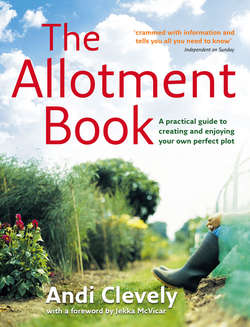Читать книгу The Allotment Book - Andi Clevely - Страница 17
GIVING UP CHEMICALS
ОглавлениеA plot that has been maintained with inorganic fertilizers and chemical treatments can often show signs of an impoverished soil structure and a dependence on supplementary feeding. Improving and feeding the soil will have long-term benefits, whether you choose to grow organically or continue to use chemical inputs. Growing fully organic crops on it immediately may, at first, lead to depressed yields, especially while it is difficult to produce or acquire enough compost and manure. Also, pest and disease problems can escalate when plants are not sufficiently vigorous to withstand attacks. If you decide to garden organically, you may prefer to adopt a gradualist approach and compromise, using chemical treatments at least for the first two to three seasons while the new routine is established.
You can respond to particular pests and diseases with treatments of low toxicity or short persistence, or try to avoid them with traps, barriers and deterrents. Instead of using herbicides, you can manage weeds by mulching, hoeing, hand-weeding, spacing the crops in such a way that denies weeds light, and minimal cultivation to avoid germinating weed seeds.
The result is produce that may taste better – but this is also affected by other cultural factors such as variety, season or the amount of watering – and that will certainly be free from any chemical residues. The soil will be nurtured rather than exploited, abused or simply taken for granted; wildlife is respected and encouraged; and you will have avoided waste by recycling compostable materials and returning them to the soil.
